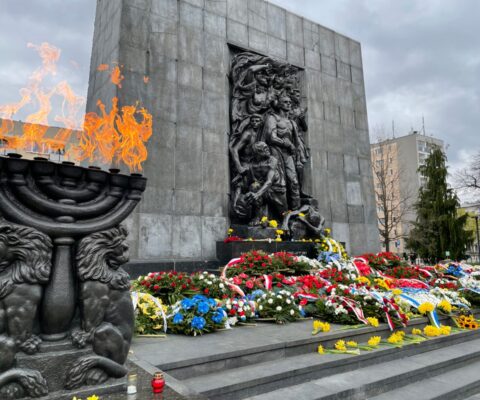The presidents of Poland, Israel, and Germany, as well as representatives of the Catholic Church and the Jewish community on Wednesday, April 19, paid tribute to the heroes of the Warsaw Ghetto Uprising on the 80th anniversary of its outbreak. „Whoever sows hatred tramples on the graves of the heroes of the Warsaw Ghetto Uprising,” Polish President Andrzej Duda said during his speech.

Photo : Family News Service
Israeli President Isaac Herzog noted that although, in human terms, the fighters lost, the human spirit won. „Most of the fighters of the Warsaw Ghetto Uprising did not survive, but the human spirit prevailed here, on this land sanctified by the blood of our heroic brothers,” Herzog said.
German President Frank-Walter Steinmeier pointed to the need to keep the memory of the heroes of the Uprising alive. „Preserving the memory of Jewish life in Poland and Europe, Jewish life flourished again and will continue to flourish. That is why it is so important that we remember. That’s why it is so important that we – we, Germans – remember,” Steinmeier stressed.
In a message on the anniversary celebrations, the Chairman of the Polish Bishops’ Conference Committee for Dialogue with Judaism, Archbishop Grzegorz Ryś, stressed the importance of the attitude of the ghetto heroes in defending human dignity. „During the terrible days of the Holocaust and the Warsaw Ghetto Uprising, you were defending – and defended – human dignity, the human right to live with dignity, including the right to die with dignity,” Archbishop Ryś wrote.
In commemoration of the 80th anniversary of the Uprising, the celebration took on a particularly solemn tone. At 11 am, the Institute of National Remembrance opened the „We ask you, God, for a bloody struggle…” exhibition at Hoover Square on Krakowskie Przedmieście in Warsaw.
The main ceremonies took place in front of the Warsaw Ghetto Heroes Monument. They were organized by the Polish President’s office in cooperation with many cultural and historical institutions. Presidents Andrzej Duda, Isaac Herzog, and Frank-Walter Steinmeier laid wreaths before the Monument. Jewish community members and Catholic Church representatives were also present, including Warsaw Metropolitan Cardinal Kazimierz Nycz and Archbishop Grzegorz Ryś.
For the past ten years, the POLIN Museum in Warsaw has been organizing the socio-educational campaign „Daffodils,” linked to Marek Edelman, an outstanding personality and the Uprising’s last leader. He survived the liquidation of the ghetto and, for years, nurtured the memory of the events of 1943. Until the end of his life, on the anniversary of the Uprising, he paid tribute to his comrades by placing a bundle of daffodils in front of the Ghetto Heroes Monument. Daffodils are a symbol of respect and remembrance for the victims of the Holocaust, especially those who perished as a result of the liquidation of the ghettos and the Warsaw Ghetto Uprising.
In addition to Warsaw, other Polish cities have joined the „Daffodils” action. The Abraham J. Heschel Center for Catholic-Jewish Relations at the John Paul II Catholic University of Lublin coordinated the initiative in this city. Symbolically, flowers were given to the University’s students, faculty, and staff.
To commemorate the 80th anniversary of the Warsaw Ghetto Uprising on April 19, at noon, the sirens of the municipal public alert and warning system sounded throughout Warsaw. The bells of the churches of the Warsaw Archdiocese also rang.
A ceremony at the Nożyk Synagogue in Warsaw, attended by heads of state, is scheduled for 5:30 pm, in conjunction with unveiling a plaque commemorating a 1946 visit of the then Chief Rabbi of Palestine, grandfather of the current Israeli president. At 8 pm, a concert by the Polish-Israeli Symphony Orchestra will take place at the Grand Theater – National Opera.
On Sunday, April 23, a March of Prayer will pass through the streets of Warsaw, following the Path of the Martyrdom of Jews, Victims of the Holocaust. It will be attended, among others, by Archbishop Grzegorz Ryś. The marches have been organized annually by the Polish Council of Christians and Jews since 1993.
The Warsaw Ghetto, with nearly half a million people at its peak, was the largest in Europe. From July to September 1942, some 300,000 Jews were deported to the Nazi German extermination camp at Treblinka. Many died in the ghetto from starvation and exhaustion. Few escaped. Those who remained in the ghetto organized the Warsaw Ghetto Uprising on April 19, 1943, which was the most prominent Jewish rebel against the German occupiers during World War II. According to various estimates, between 700 and 2,000 Jewish fighters fought. The Uprising finally collapsed on May 16, 1943, when the Germans blew up the Great Synagogue on Tłomackie Street.